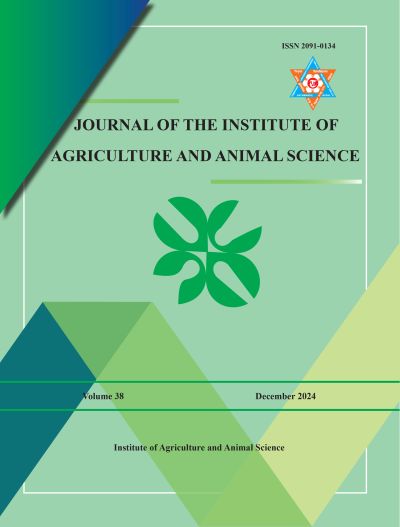Effects of Varying Durations of Synbiotic Use on Growth Performance in Cobb-500 Broilers
DOI:
https://doi.org/10.3126/jiaas.v38i1.73085Keywords:
Synbiotic, Broiler performance, Antibiotic alternatives, Optimal durationAbstract
Synbiotics, a combination of probiotics and prebiotics, are increasingly being explored as alternatives to antibiotics in poultry nutrition due to rising consumer demand for antibiotic-free products and concerns about antibiotic resistance. With these issues, and the ban on antibiotics as growth promoters, the poultry industry is shifting toward natural feed additives. Synbiotics have gained attention for their potential as an effective growth promoter. Broiler growth performance, a critical factor for profitability, can be enhanced using synbiotics, which improve gut health, increase feed efficiency, and boost overall growth. The effectiveness of synbiotics, however, is influenced by the method, timing, and duration of administration. This study focuses on determining the optimal duration of synbiotic supplementation to maximize weight gain, feed conversion ratio (FCR), and gut health, aiming for more efficient and sustainable poultry production. To evaluate the impact of varying supplementation durations, a trial was conducted with day-old Cobb-500 chicks (420 in number), divided into seven treatment groups with six replicates of 10 chicks each. The study was carried out at Fewa Group of Poultry Industries Pvt. Ltd., Pokhara, Nepal, over six weeks, with weekly treatments lasting from the 1st to the 6th week, including a control group without synbiotic supplementation. Weekly performance parameters such as feed consumption, weight gain, and FCR were recorded. The results demonstrated that continuous synbiotic supplementation in feed throughout the rearing period of 6 weeks at the recommended levels significantly improved growth performance. Feed consumption increased notably in the fifth and sixth weeks, while weight gain was positively influenced from the third week onward. Additionally, cumulative feed intake, average weight, and FCR at 42 days showed substantial improvement, indicating that synbiotics are a viable alternative to antibiotics for promoting growth when used throughout the rearing periods of 6 weeks in broiler production.
Downloads
Downloads
Published
How to Cite
Issue
Section
License
Copyright (c) 2024 Journal of Institute of Agriculture and Animal Science

This work is licensed under a Creative Commons Attribution-NonCommercial 4.0 International License.

